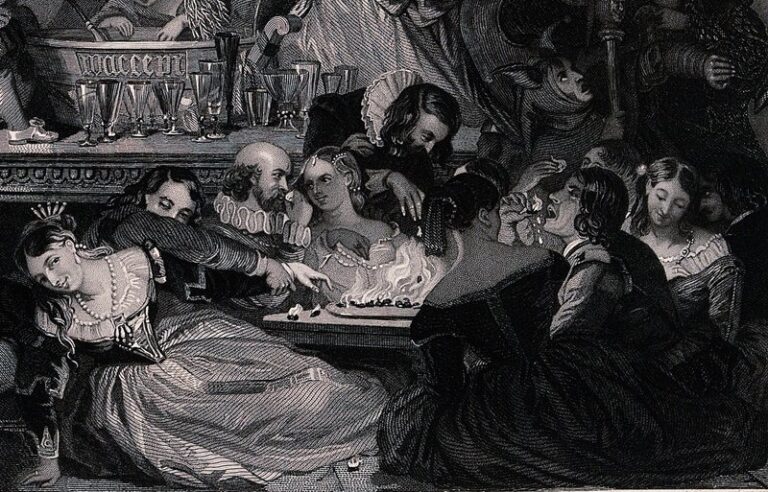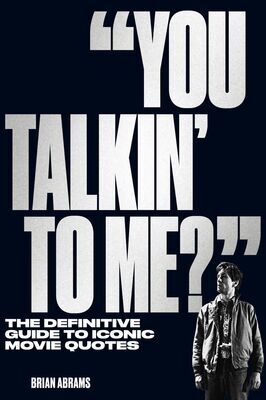JUDAS AND THE BLACK MESSIAH: A Revolutionary Take On The Black Panthers And The Civil Rights Movement
For years, there has been a cry for diversification in the stories that Hollywood tells. Only in recent years has this cry been both recognized and slowly answered, films like Moonlight, Green Book and MLK/FBI not only finding fruition but recognition. There is an entire wealth of stories yearning to be told, and just as importantly, to be heard. The latest film to join these ranks is the highly anticipated Judas and the Black Messiah from writer and director Shaka King. Originally delayed due to the global pandemic, the film has embraced the streaming platform model, delivering its heart-wrenching account of historical events at the end of the 1960s and in the heart of the civil rights movement.
As viewers watch the fateful story of Fred Hampton, Chairman of the Illinois Black Panther Party, there is a reflective experience as the motivations of the controversial party’s leader calls for more unity than violence, his messages of freedom and the power of people as relevant today as it was in the late 1960s. The film also compounds this relevancy with its examination of those in power, the want of opportunity, and the need for survival. Judas and the Black Messiah is a nuanced film that slowly peels back its layers, revealing a depth that does not limit its audience and will resonate for years to come.
“The badge is like you have a whole damn army behind you”
Judas and the Messiah is immediately aware that its story does not begin and end with Fred Hampton, nor with William O’Neal. There is a before and an after, with its aftermath rippling from its core story. Opening the film is a recreated snippet of the Eyes on the Prize interview, Bill O’Neal speaking to the camera, his interview taking place in 1989. While it is brief in its inclusion, the film diving into archived civil rights footage shortly after, it immediately establishes two narrative structures.
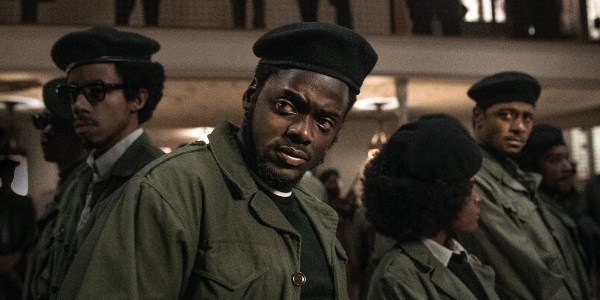
Following its opening sequences, Judas and the Black Messiah brings viewers into a dark room, a stage and screen reminiscent of both 1984 and an Apple product launch filling the screen, encompassing an early idea of capitalism and power. J. Edgar Hoover (played by the nearly unrecognizable Martin Sheen) paces the stage, pointing to a video of Hampton on the screen, dubbing the Black Panthers to be the biggest threat to the United States of America. As a sea of white male faces looks on, he continues calling for the prevention of the rise of the Black Messiah – a belief that had strongly influenced the FBI’s surveillance on Martin Luther King Jr. If you have seen last year’s critically-acclaimed documentary MLK/ FBI, you may have an understanding that Hoover was extremely fearful of the rise of Black Messiah, a leader that would unify and lead the Black revolution. If you have not, I highly recommend you do, as it makes for a brilliant accompaniment.
The film does not linger long here either, maintaining its pace of the narrative, introducing its main players and main influences, creating a contrast to the Black Panther’s leader and the movement. Judas and the Black Messiah transitions with ease to William O’Neal (LaKeith Stanford), initially introducing him as an FBI agent, criminalizing the power of the badge to steal cars and maintain his survival. While he is initially able to securely utilize this power, his plan backfires, leaving him injured and in custody. As he awaits the charges, a laceration above his eye alluding to brutality received while in custody, a “get out of jail” card is offered by FBI agent Roy Mitchell (Jesse Plemons). He could serve his time or he could become an FBI informant, infiating the Black Panther Party.
“Rebellion is not created by a person, it is created by conditions”
It is only at this moment viewers are introduced to Fred Hampton (Daniel Kaluuya), a confident and commanding leader of the people, resolved to bring equality to the entire Black community. As he reveals his beliefs on capitalism and war vs. people, there is an initial feeling of an army being formed, a strength in numbers to bring about a revolution. It is hard to fight off the associations of revolution and violence, the two words too often synonymous with one another. Judas and the Black Messiah seems aware of this, giving time for its ideas to ebb and flow and to allow its audience time to absorb and digest. While the introduction of its characters was at a quick pace, the remainder of the film is more reserved, giving time to honor the story it has committed to telling.
This pace works well for the film as it builds on its initial message that rebellions are not created by a person but rather by conditions. As each layer is applied and pulled back for examination, viewers are made witnesses to the brutality and the betrayal. You see the living conditions, the treatment by police; we are made to feel as if the walls are closing in on the film’s characters, left only to fight or flee. There is a psychological reflex exhibited, the influences they are immersed in driving the response. It is shocking to see the aspects of a story told so briefly in history books and to understand not only the fight but the belief in the power of unity.
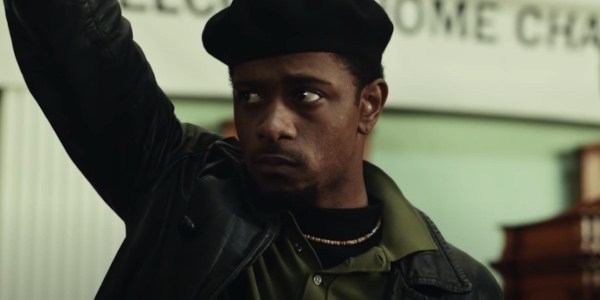
Judas and the Black Messiah is not afraid to make you feel uncomfortable, charging forward to embrace the story of Fred Hampton and William O’Neal. From its title to its basic narrative structure, the parallelism to the Christian story of Judas betraying Jesus further drives the film’s strength. Where capitalism drives the want of opportunity, O’Neal not only takes on the representation of Judas, but also the capitalists’ exploitation of the people. Though like Judas, he too is exploited, given a false sense of equality and opportunity, monetary value the only value he will ever achieve.
The strength in narrative and structure in Judas and the Black Messiah is further driven by its stellar cast, with Kaluuya and Stanfield giving career performances. Kaluuya is confident and commanding in both speech and stature. He disappears into his character, allowing Hampton to live on through the film and in his portrayal. Stanfield delivers a compounding performance of guilt, greed, and self-preservation. There is a constant sense of inner turmoil, one that will draw both sympathy and disgust from its audience. As they each play against forces – both seen and unseen – there is a commitment that never waivers. Jesse Plemons is also memorable here, Roy’s teetering beliefs and guilted conscience only visible through his eyes, his face retaining the stoic nature one would expect of a government official. You see the inner battle, and you see the quiet moment of decisions made for the perseverance of himself and his family. He is restrained, keeping his character quiet and comfortable, yet aware of the power and influence he possesses.
“Anywhere there is people there is power”
One of the most astonishing aspects of Judas and the Messiah is its relevance to present times. We are still fighting exactly the same battle against the same power. Judas and the Messiah displays is a multi-layered depiction of guilt, opportunity, power, and a fight for equality that can still be seen throughout present times. With Roy and Bill, there is a mutual goal for opportunity and self-preservation. Bill avoids jail and is paid for his troubles by becoming a successful informant. Roy strikes the opportunity for advancement in the FBI and further financial gain, while his family remains safe and maintains their lifestyle. While each man struggles with a guilty conscience, their end game is still the same. Fred Hampton and the Black Panthers contrast both O’Neal and Roy, their willingness to literally give their lives to the people, unifying not only the Black masses but Hispanics, confederists, and even rival organizations as well. There is a sense of community and a break of ecocentric motivations.
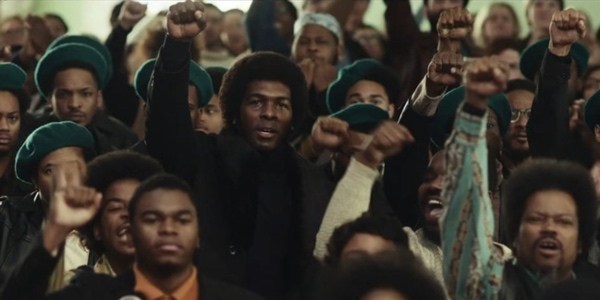
The film is also aware of the FBI and J. Edgar Hoover‘s fear of the Black Messiah. Yet, for the first time, I realized this idea of a Black Messiah was not strictly limited to the idea of the Black revolution, but rather a Black Messiah that could unify all people. There are various moments when Hampton approaches his rivals, unarmed and with the ideas of equality and unity. He challenges the perceived notions of lines drawn in the sand, offering the idea that the rights being fought for by the Black community are similar to theirs. And what a powerful force they could all be united. This is momentarily witnessed within Judas and the Black Messiah, a mise en scène of multicolored faces in a crowd speaking to this idea of unifying the people. I couldn’t help but see the same images mirrored last year in the multi-colored hands thrown in the air, calling for equality and the end of police brutality.
Judas and the Messiah also tackles the idea of perceived equality. Roy and Bill are initially shown as equals, as Bill invited to his home where he’s treated to dinners and fine scotch. Yet, this illusion of equality is broken down and altered as one has more power over the other. Viewers are constantly reminded of this by the fancy steak dinners Roy provides and the constant filming of Roy standing while O’Neal is sitting. This illusion of equality also applies to those with perceived power as well. In Roy’s case, the freedom of thought and free will is broken down, a heart-shattering scene with Hoover pushing his teetering beliefs over the edge.
Conclusion: Judas and the Black Messiah
Judas and the Black Messiah is a clear example of why we need more films like this. There is an untold history that needs to be recalled and understood. Here, not only is history being revealed, but it is a letter to and of the people. It is a reminder of the power of unity and the strength of community. By far my favorite film of the year, I hope for its recognition throughout the awards season and for years to come.
Have you seen Judas and the Black Messiah? What did you think? Let us know in the comments below!
Judas and the Black Messiah was released on HBO Max on February 12, 2021.
Watch Judas and the Black Messiah
Does content like this matter to you?
Become a Member and support film journalism. Unlock access to all of Film Inquiry`s great articles. Join a community of like-minded readers who are passionate about cinema – get access to our private members Network, give back to independent filmmakers, and more.
Join now!
